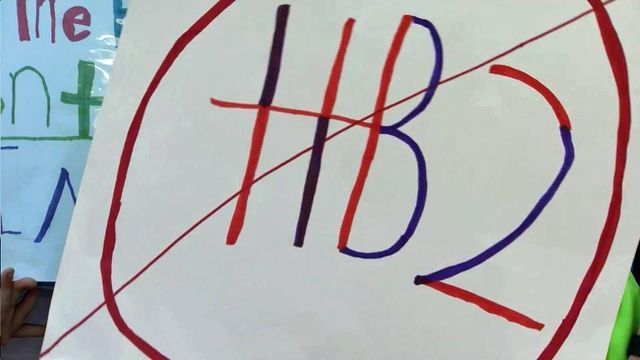Citing HB2, PayPal cancels planned Charlotte expansion
PayPal, an online money transfer service, has canceled its plans to open an operations center in Charlotte, citing North Carolina's anti-discrimination law.
Posted — UpdatedThe company announced plans on March 18 to open a $3.5 million global operations center that would have employed 400 people. Five days later, Gov. Pat McCrory signed into law House Bill 2, which bars transgender people from using the public bathroom of the gender with which they identify.
The law also excludes sexual orientation and gender identity as protected groups under a statewide anti-discrimination policy and prohibits cities and counties from extending such protections.
"As a result, PayPal will not move forward with our planned expansion into Charlotte."
According to the governor's press release on the day the expansion was announced, the new center would have had an annual payroll of about $20.7 million.
Chris Sgro, executive director of LGBT advocacy group Equality NC, said the move "makes it clear as day that HB2 is dangerous and harmful legislation."
"The Governor and our North Carolina General Assembly leadership must immediately make it clear that their intentions are to repeal HB2 when they will meet for session on April 25," Sgro said in a statement. "This is a must if we are to remain an economically competitive state."
McCrory shrugged off PayPal's announcement.
"I respect disagreement," McCrory said, adding he has no regrets about signing the law. "For those who disagree with that basic norm, they have that decision to make. I expect that PayPal will still provide their services and accept our consumer money in the state of North Carolina."
During a March 28 groundbreaking in Clayton for Novo Nordisk, McCrory said that he had not heard from companies upset about House Bill 2, and he blamed reporters for overreacting to statements by companies.
"I haven't heard them threaten to leave. This is another example of the media exaggerating. I have not had one corporation tell me that they're threatening to leave," he said at the time.
Asked Wednesday whether PayPal's announcement undercut that assessment and shows there was an economic impact on the state, McCrory said it does not.
"I think my comments were said at that point in time," he said, then quickly repeating, "I'm going to respect people who disagree with our basic common-sense rules that I had here at Ragsdale High School in which boys used the boys locker room and girls used the girls locker room. That's what we were trying to correct from government overreach, which was going to force businesses and our schools to do just the opposite. If people disagree with that, that's part of our democratic process, and I'm going to respect that."
Pressed as to whether that means he is now seeing an economic impact from the law, McCrory said, "I think I've answered your question."
Charlotte Mayor Jennifer Roberts expressed disappointment over PayPal's decision.
"I am deeply troubled by the loss of PayPal jobs as a result of HB2. I urge our state assembly to find a legislative remedy as soon as possible before more North Carolina families are harmed by this bill," Roberts said in a statement. "Charlotte has clearly expressed our own commitment to equality, and I urge the state to make clear its commitment to non-discrimination for all people."
Attorney General Roy Cooper, the Democratic candidate for governor, called on McCrory to push for the law's repeal.
"The threat that HB2 poses to jobs and our economy is no longer a possibility. It's a reality," Cooper said in a statement. "These are new, better-paying jobs North Carolina won't get because Governor McCrory has put his political ideology above all else. It's time to reverse course and take actions to undo the damage."
Republican legislative leaders and McCrory's campaign fired back at Cooper.
"If Jennifer Roberts, Roy Cooper and the far-left Political Correctness Mob she's unleashed really care about the economic future of her city, they’ll stop the misinformation campaign immediately and start telling the truth about this common-sense bathroom safety law before more damage is done to the city she was elected to lead and the state Cooper was elected to protect," House Speaker Tim Moore and Senate President Pro Tem Phil Berger said in a joint statement.
"Attorney General Cooper continues to side with out-of-state and Washington, D.C., special interests over what's best for North Carolina and its families," McCrory campaign manager Russell Peck said in a statement.
Other firms reconsider NC expansions
PayPal is at least the second firm to withdraw business from North Carolina because of the discrimination law.
Last week, Lionsgate Films pulled a comedy series pilot from Charlotte and moved the production to Canada, citing House Bill 2.
"HB2 was a bad law to begin with, but now it’s costing North Carolina jobs," Gerrick Brenner, executive director of left-leaning group Progress NC Action, said in a statement. "PayPal certainly won’t be the last big company to leave North Carolina unless this misguided law is repealed."
"HB2 does not reflect the values of our people, our state or our democratic process. The speed with which it was passed and lack of constituent input enabled a select group of North Carolina representatives to ignore their responsibility to represent the whole state and, instead, eviscerate the civil rights of North Carolinians," Elias wrote in the letter. "As a CEO who is committed to expanding our Charlotte presence by 500 people in 2016 and thousands after that, I am also forced to seriously reconsider adding more jobs in a state that tolerates discrimination and allows political interests to interfere with doing what is right for all citizens."
State officials in December approved incentives of up to $2.65 million for Red Ventures to expand in Charlotte.
Tami Fitzgerald, executive director of the North Carolina Values Coalition, criticized stances by companies such as PayPal and Red Ventures that have received state incentives.
"PayPal had received millions of dollars in corporate incentives just to come to North Carolina, and a company with its hands in the pockets of the taxpayers of North Carolina shouldn’t insert itself into the bathroom policies of the state," Fitzgerald said in a statement.
More than 120 corporate chief executives have signed onto a letter denouncing the new law, and Atlanta on Tuesday joined the growing list of cities and states blocking non-essential travel by government workers to North Carolina because of the law. The American Society of Interior Designers is calling on its nearly 26,000 members to boycott the High Point Market Expo this month, and organizers of upcoming conventions in Raleigh have expressed concern over the legislation, although no cancelations have been reported.
Senate Minority Leader Dan Blue predicted the negative reaction to House Bill 2 will continue to rain down on the state.
"The statewide business community needs to get a handle on this and figure out how we’re going to assure not only people in North Carolina but around the country that we do not believe in discrimination," said Blue, D-Wake. "We can’t afford to lose jobs. We’re about creating opportunity and jobs in North Carolina."
House Majority Leader Mike Hager said the loss of the 400 PayPal jobs is disappointing, but pointed out that the company stood to receive economic incentives of up to $2.7 million for its investment of $3.7 million.
"At the end of the day, it was going to be really not a net gainer for Charlotte-Mecklenburg," said Hager, R-Rutherford. "400 jobs would have been great, but we can take that, know what we learned from that, and apply it to something else, and probably get a better opportunity."
"You can’t let companies that can go anywhere," he said, "dictate what your philosophy is and your policy is in North Carolina. We have to stand by what we believe is good for our citizens and good for our constituents, and that’s what we’re doing in this case."
Hager said he's confident business will return to the state, citing a lack of fallout over North Carolina's 2011 adoption of a constitutional amendment barring same-sex marriages. The U.S. Supreme Court later voided that amendment.
"Folks will say a lot of things, but when they actually look at their tax rates in North Carolina, they look at the economy in North Carolina, they look at our workers in North Carolina, they look at our great climate in North Carolina, our great UNC system, those overweigh a lot of the other issues," he said.
Related Topics
• Credits
Copyright 2024 by Capitol Broadcasting Company. All rights reserved. This material may not be published, broadcast, rewritten or redistributed.






